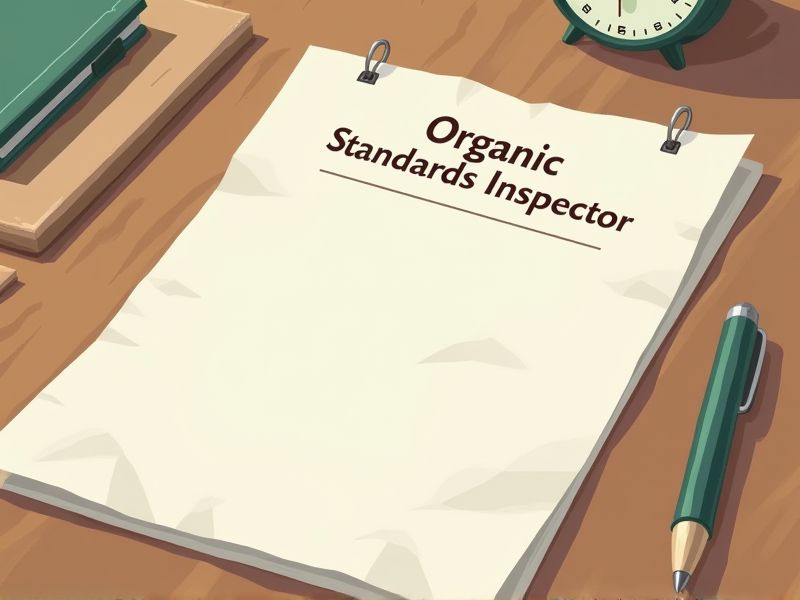
Organic Standards Inspectors ensure that food products meet established organic regulations, which requires a strong understanding of specific organic practices and principles. Certifications validate an inspector's knowledge in areas like sustainable agriculture, proper labeling, and adherence to organic guidelines. By obtaining certifications, inspectors demonstrate reliability and competence, which is crucial for maintaining the integrity of organic standards. Essential certifications for an Organic Standards Inspector include those related to organic agriculture, food safety, and regulatory compliance.
USDA Organic Certification Training
USDA Organic Certification Training is essential for Organic Standards Inspectors because it ensures they understand the comprehensive guidelines set by the USDA, which promotes consistency in organic labeling. This training equips inspectors with the knowledge to accurately evaluate whether farming practices meet strict organic standards, protecting consumer trust. Without understanding these standards, inspectors risk misjudging compliance, potentially leading to fraudulent claims in the organic market. Training also updates inspectors on any changes in organic regulations, maintaining the integrity and credibility of organic certification.
Certified Organic Standards Inspector
A Certified Organic Standards Inspector ensures compliance with organic farming regulations, reducing the risk of fraudulent practices. Their certification equips them with the knowledge to identify discrepancies in organic labeling, which maintains consumer trust. Certification enhances the inspector's credibility, which supports accurate evaluations and reporting. Their expertise assists in maintaining consistent organic standards across different regions and products.
International Organic Inspectors Association (IOIA) Certification
Obtaining the IOIA Certification ensures inspectors possess a verified understanding of global organic standards, enhancing credibility. The certification process equips inspectors with the necessary skills to identify compliance and non-compliance, supporting consistent quality assurance in organic products. Certification fosters trust among producers, consumers, and regulatory bodies, facilitating smoother trade and communication within the organic market. As organic industry regulations continue to evolve, certified inspectors remain up-to-date with the latest standards and practices.
IFOAM Accreditation for Organic Inspectors
IFOAM Accreditation ensures that organic inspectors adhere to international organic standards, enhancing the credibility of organic certification processes. Due to rigorous training, inspectors demonstrate proficiency in assessing organic operations, reducing the risk of non-compliance. Such accreditation builds consumer trust by ensuring consistency and reliability in organic labeling. Market access and international trade opportunities expand as certified products meet global organic standards through accredited inspection.
Certified Organic Auditor Program
The Certified Organic Auditor Program is crucial because it establishes a standardized methodology for inspecting organic farms, ensuring consistency in the enforcement of organic standards. This program enhances the credibility of organic products in the market by verifying compliance with stringent regulations. Training auditors ensures that organic inspections are conducted with a scientific approach, minimizing the risk of fraudulent practices. As consumer demand for organic products rises, the program supports the integrity of the organic label, fostering trust between producers and consumers.
Certified Quality Auditor (ASQ CQA)
Certified Quality Auditors possess the expertise to systematically assess and verify compliance with established standards, which is crucial for maintaining the integrity of organic certifications. Rigorous auditing by a CQA ensures that organic standards are consistently met, reducing the risk of non-compliance and potential fraud. Their knowledge in process improvement and quality management aids in identifying deficiencies and implementing corrective actions, thereby enhancing the overall credibility of organic products. Utilizing CQAs in inspections aligns with the growing consumer demand for transparency and trust in organic labeling.
HACCP Certification
HACCP Certification ensures that Organic Standards Inspectors understand critical control points in food safety. This understanding aids in effectively assessing organic production processes, which often emphasize minimal chemical intervention. Inspectors with HACCP training can better identify potential contamination risks in organic supply chains. The certification also aligns organic inspections with international food safety standards, enhancing market credibility.
ISO 22000 Food Safety Management System Auditor Certification
ISO 22000 Food Safety Management System Auditor Certification equips inspectors with the skills to evaluate and enhance food safety protocols in organic operations. The certification ensures inspectors can comprehensively assess compliance with international food safety standards, which is critical for maintaining organic product integrity. Auditors with this certification are better prepared to identify potential hazards and inefficiencies within organic food supply chains. This expertise supports the credibility and safety of organic products in the market.
Good Agricultural Practices (GAP) Certification
Good Agricultural Practices (GAP) Certification is crucial for Organic Standards Inspectors because it establishes a universal benchmark for ensuring food safety and sustainability. The certification provides inspectors with a structured framework to assess and verify the farming processes that align with organic standards. It enhances the credibility of organic claims by verifying that farms are adhering to environmental and health regulations. GAP Certification also supports the continuous improvement of farming practices by promoting accountability and transparency in organic agriculture.
ISO 14001 Environmental Management Systems Lead Auditor Certification
An ISO 14001 Environmental Management Systems Lead Auditor Certification equips an inspector with the expertise to evaluate and ensure compliance with environmental regulations within organic farming operations. This certification provides credibility and a structured framework for assessing an organization's environmental impact and sustainability practices. It enhances the inspector's ability to identify areas for improvement, thereby helping organic producers reduce their environmental footprint. With growing consumer demand for environmentally responsible products, certifying compliance with ISO 14001 can strengthen market competitiveness for organic producers.
Summary
As a reader, understanding the impact of an Organic Standards Inspector obtaining certifications can enhance your trust in organic products. These certifications lead inspectors to ensure compliance with strict organic guidelines, which can increase product reliability. The certified expertise of inspectors might result in better market access for organic producers and reassure consumers about product authenticity. As a consequence, the entire supply chain can benefit from improved transparency and integrity.
